My Italian Home: How one 'bargain basement' renovation ended up costing over €300K
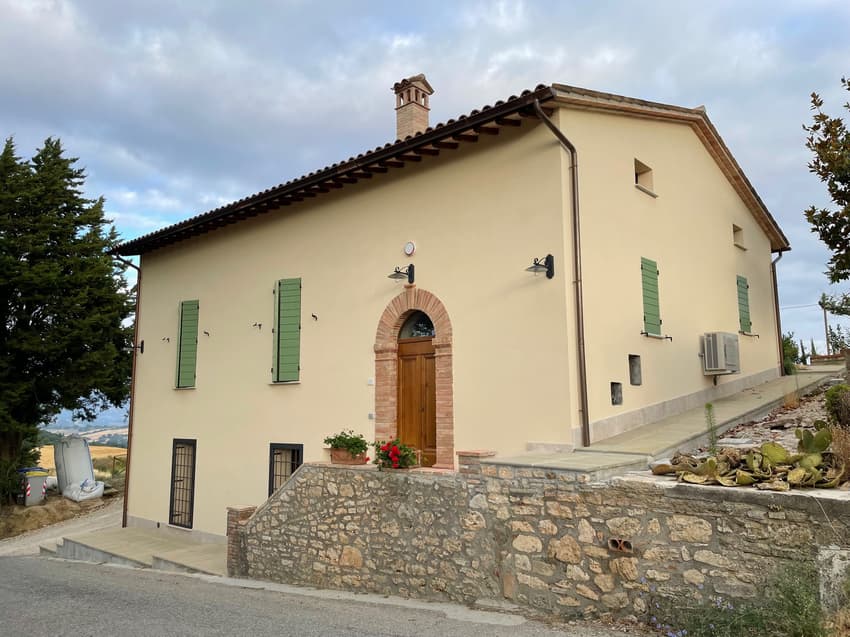
For one British couple, turning an old village school in Umbria into a new home became a bigger project than they'd originally planned on.
The story of how Tim Walker and his wife moved to Italy is a familiar one: happy holidays and fond memories of Italy built up over years of travelling to the country planted the seed for retiring to il bel paese.
In 2011, they came across an old property in Todi, Umbria, a hilltop medieval town.
The building was "unappealing" and "featureless", according to Tim, but they were taken with it and could see its potential.
On closer inspection, they discovered it was once a village school that dates back to the 1850s, with classrooms downstairs and accommodation for the teacher who lived upstairs.
Charmed by the history and the quaint hamlet of just 30 residents in which it resides, they decided to buy it. At that point, they weren't sure when they would move to Italy to retire.
Over the years, they came out to visit the property for about five to six weeks a year, taking on the project themselves. It was a DIY effort and "didn't involve anything serious or structural", he told us.
READ ALSO: My Italian Home: ‘We bought the cheapest house in Piedmont and live mortgage free’
"We did some cosmetic work to make it bearable, as when we bought it, it was your grandmother's house - not very attractive with aged decor," he said.
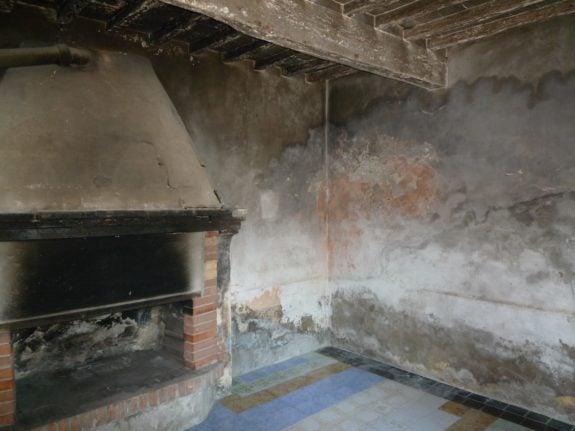
The old kitchen that Tim described as 'decrepit'. Photo: Tim Walker.
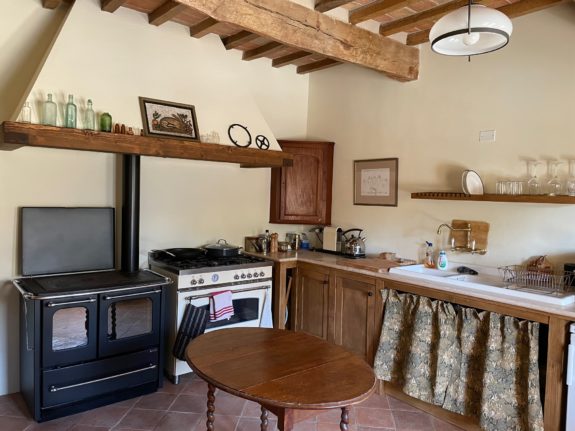 They carried out some renovation works themselves, including building some kitchen furniture. Photo: Tim Walker
They carried out some renovation works themselves, including building some kitchen furniture. Photo: Tim Walker
"We spent seven years thinking about what to do with it, making small changes ourselves in that time, but then we began the project which was much more extensive," he added.
The former London professionals decided to speed up their retirement plans in light of Brexit and get residency in Italy before it became much more complicated for British nationals.
READ ALSO: How British citizens can retire to Italy after Brexit
So, in 2019 they embarked on their house project on a much bigger, structural scale.
Although Tim said the project started off as "bargain basement", costs quickly mounted, they had a few surprises when it came to some essential jobs and the price of certain items far outstripped what they were expecting.
"We spent a lot more than we initially intended. We could have spent a lot less definitely, but when it comes to renovation, there are no limits," he said.
However, it wasn't a case of just wanting to add more and more to the project. The property turned up a few unexpected jobs, as is often the case with old buildings that haven't been restored - sometimes, ever.
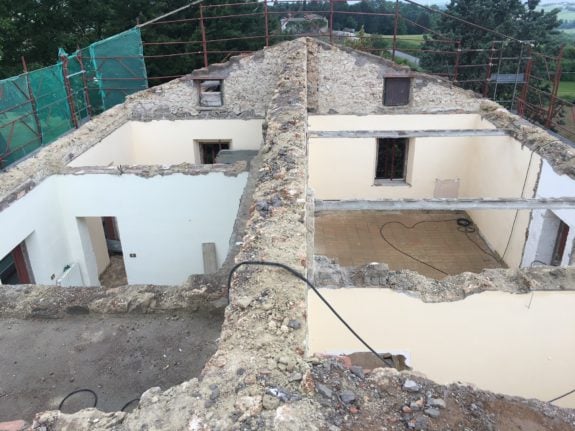
For their 170-year old home, they found that they went over by 10 percent for core building costs. They weren't anticipating to have to pay for extra foundations, but they discovered there were, in fact, no foundations.
They also discovered that the cost of windows and shutters were much more expensive than they had planned on. In the end, that cost them double their initial estimate, with some quotes coming in at three times as much.
READ ALSO: How to stay out of trouble when renovating your Italian property
Other big-ticket expenses included the external insulation or 'cappotto', but he admitted "they made choices" and chose the more expensive, durable option.
The house also needed to be earthquake-proofed, and they made necessary plumbing and electricity upgrades, which all in all, has led to a safe and energy efficient home.
In the end, their renovation cost came in at €320,000 - a price far exceeding what anyone would describe as the 'bargain' they initially envisaged.
For some, such huge surprises, along with the hidden fees of buying a house in Italy in the first place, can derail a project entirely.
READ ALSO:
- Six things you need to know about claiming Italy’s ‘Sismabonus’
- EXPLAINED: The hidden costs of buying a home in Italy
Luckily for Tim and his wife, they were in a position to foot the bill and take a much broader view of the situation, as that's the place they want to stay.
"If we were looking to sell it in five years, would we make our money back? Who knows? But it doesn't matter, as we are looking to live here, we’re not looking to sell it on," he said.
Beyond the fundamental jobs, they made their own adjustments according to their vision for their home, such as raising the ceilings and knocking down rooms to open up spaces and allow more light in.
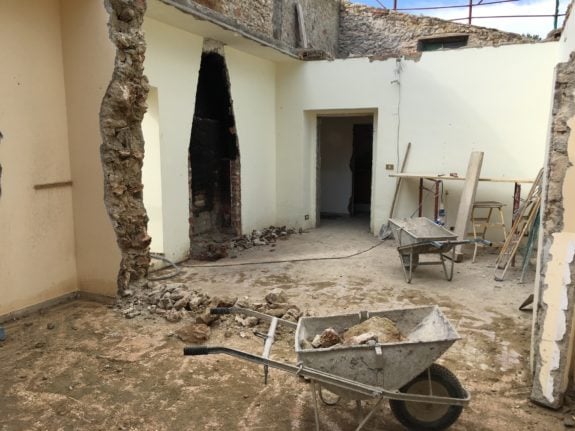
The living room got more than a lick of paint. Photo: Tim Walker
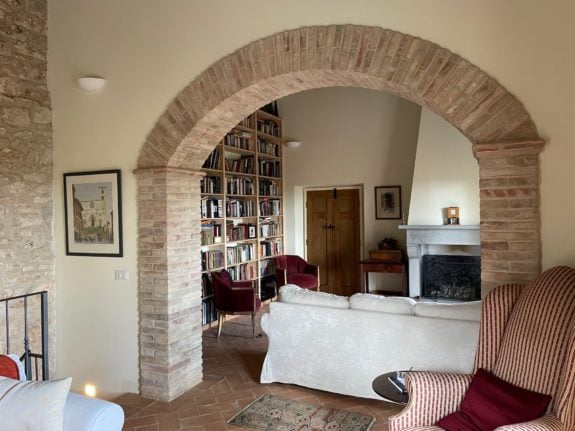 After structural work came their personal design choices, such as opening up rooms. Photo: Tim Walker
After structural work came their personal design choices, such as opening up rooms. Photo: Tim Walker
They also have land with the home, which they are working on clearing and have planted olive trees, some of which are already productive.
They couldn't be happier with the spacious retired life they've constructed after living in a Victorian terrace in England.
But, of course, it came with lessons along the way.
Aside from the inflated budget, Tim said they learnt a lot about the house renovation process in Italy.
"The more you can pin down what you want to do before you start is absolutely essential - it’s when you change your mind mid-project the costs start to ramp up," he told us.
He also pointed to the importance of solid relationships with the people carrying out the work, such as the geometra (civil surveyor) and building companies.
"It is absolutely crucial to have a good relationship with the people renovating your home. We were available all the time and wandered over most evenings to see progress," he said.
"It is really important to be there and take decisions. If you're doing the project at a distance, you need to find a way to get constant updates and pictures," he advised.
One area people who are renovating property in Italy need to be aware of are the cultural differences, according to Tim.
"Things happen differently here than they do in the UK or US - it doesn’t matter if you don’t like the way they do it, they’ll work that way anyway. If you try to impose your value and methodology on an Italian geometra, an architect or constructor, you’re going to get out of shape," he warned.
In fact, they managed to get a reduced VAT rate on the renovations, because they worked with a geometra who could negotiate that on their behalf.
Although they didn't use any building bonuses in their works, any discounts are a gain in the face of mounting expenses and fees.
Tim also pointed to the language of construction when renovating Italian property - which goes beyond simply understanding Italian.
"Our builders and geometra were using words for things were not in the dictionary or translator," he said.
To work around that, he said he used the help of an Italian friend at first who could interpret. Someone who can communicate what you want is an asset, according to Tim, as without it, you may not always get what you planned.
He described their process as a "slow burn" and that their life in Italy was a natural progression after first buying a little bolthole in 2005.
It's an attitude that seems to suit them well in their tiny community. "We've spent a long time getting to this point - I feel absolutely blessed every day I’m here," he said.
"It's true that you’re always a foreigner but I have to say I haven’t found moving here particularly challenging. We don’t miss our cheddar cheese and baked beans - that’s not where our heads are. That’s part of the reason why we’re here, to live differently.
"We love being here. We have felt very welcome both by the local community and also the immigrant community that we’re part of. We are incredibly lucky."
See more in The Local’s Italian property section.
Do you have a renovation story to share? We’d love to hear from you – email us here.
Comments (1)
See Also
The story of how Tim Walker and his wife moved to Italy is a familiar one: happy holidays and fond memories of Italy built up over years of travelling to the country planted the seed for retiring to il bel paese.
In 2011, they came across an old property in Todi, Umbria, a hilltop medieval town.
The building was "unappealing" and "featureless", according to Tim, but they were taken with it and could see its potential.
On closer inspection, they discovered it was once a village school that dates back to the 1850s, with classrooms downstairs and accommodation for the teacher who lived upstairs.
Charmed by the history and the quaint hamlet of just 30 residents in which it resides, they decided to buy it. At that point, they weren't sure when they would move to Italy to retire.
Over the years, they came out to visit the property for about five to six weeks a year, taking on the project themselves. It was a DIY effort and "didn't involve anything serious or structural", he told us.
READ ALSO: My Italian Home: ‘We bought the cheapest house in Piedmont and live mortgage free’
"We did some cosmetic work to make it bearable, as when we bought it, it was your grandmother's house - not very attractive with aged decor," he said.


"We spent seven years thinking about what to do with it, making small changes ourselves in that time, but then we began the project which was much more extensive," he added.
The former London professionals decided to speed up their retirement plans in light of Brexit and get residency in Italy before it became much more complicated for British nationals.
READ ALSO: How British citizens can retire to Italy after Brexit
So, in 2019 they embarked on their house project on a much bigger, structural scale.
Although Tim said the project started off as "bargain basement", costs quickly mounted, they had a few surprises when it came to some essential jobs and the price of certain items far outstripped what they were expecting.
"We spent a lot more than we initially intended. We could have spent a lot less definitely, but when it comes to renovation, there are no limits," he said.
However, it wasn't a case of just wanting to add more and more to the project. The property turned up a few unexpected jobs, as is often the case with old buildings that haven't been restored - sometimes, ever.

For their 170-year old home, they found that they went over by 10 percent for core building costs. They weren't anticipating to have to pay for extra foundations, but they discovered there were, in fact, no foundations.
They also discovered that the cost of windows and shutters were much more expensive than they had planned on. In the end, that cost them double their initial estimate, with some quotes coming in at three times as much.
READ ALSO: How to stay out of trouble when renovating your Italian property
Other big-ticket expenses included the external insulation or 'cappotto', but he admitted "they made choices" and chose the more expensive, durable option.
The house also needed to be earthquake-proofed, and they made necessary plumbing and electricity upgrades, which all in all, has led to a safe and energy efficient home.
In the end, their renovation cost came in at €320,000 - a price far exceeding what anyone would describe as the 'bargain' they initially envisaged.
For some, such huge surprises, along with the hidden fees of buying a house in Italy in the first place, can derail a project entirely.
READ ALSO:
- Six things you need to know about claiming Italy’s ‘Sismabonus’
- EXPLAINED: The hidden costs of buying a home in Italy
Luckily for Tim and his wife, they were in a position to foot the bill and take a much broader view of the situation, as that's the place they want to stay.
"If we were looking to sell it in five years, would we make our money back? Who knows? But it doesn't matter, as we are looking to live here, we’re not looking to sell it on," he said.
Beyond the fundamental jobs, they made their own adjustments according to their vision for their home, such as raising the ceilings and knocking down rooms to open up spaces and allow more light in.


They also have land with the home, which they are working on clearing and have planted olive trees, some of which are already productive.
They couldn't be happier with the spacious retired life they've constructed after living in a Victorian terrace in England.
But, of course, it came with lessons along the way.
Aside from the inflated budget, Tim said they learnt a lot about the house renovation process in Italy.
"The more you can pin down what you want to do before you start is absolutely essential - it’s when you change your mind mid-project the costs start to ramp up," he told us.
He also pointed to the importance of solid relationships with the people carrying out the work, such as the geometra (civil surveyor) and building companies.
"It is absolutely crucial to have a good relationship with the people renovating your home. We were available all the time and wandered over most evenings to see progress," he said.
"It is really important to be there and take decisions. If you're doing the project at a distance, you need to find a way to get constant updates and pictures," he advised.
One area people who are renovating property in Italy need to be aware of are the cultural differences, according to Tim.
"Things happen differently here than they do in the UK or US - it doesn’t matter if you don’t like the way they do it, they’ll work that way anyway. If you try to impose your value and methodology on an Italian geometra, an architect or constructor, you’re going to get out of shape," he warned.
In fact, they managed to get a reduced VAT rate on the renovations, because they worked with a geometra who could negotiate that on their behalf.
Although they didn't use any building bonuses in their works, any discounts are a gain in the face of mounting expenses and fees.
Tim also pointed to the language of construction when renovating Italian property - which goes beyond simply understanding Italian.
"Our builders and geometra were using words for things were not in the dictionary or translator," he said.
To work around that, he said he used the help of an Italian friend at first who could interpret. Someone who can communicate what you want is an asset, according to Tim, as without it, you may not always get what you planned.
He described their process as a "slow burn" and that their life in Italy was a natural progression after first buying a little bolthole in 2005.
It's an attitude that seems to suit them well in their tiny community. "We've spent a long time getting to this point - I feel absolutely blessed every day I’m here," he said.
"It's true that you’re always a foreigner but I have to say I haven’t found moving here particularly challenging. We don’t miss our cheddar cheese and baked beans - that’s not where our heads are. That’s part of the reason why we’re here, to live differently.
"We love being here. We have felt very welcome both by the local community and also the immigrant community that we’re part of. We are incredibly lucky."
See more in The Local’s Italian property section.
Do you have a renovation story to share? We’d love to hear from you – email us here.
Join the conversation in our comments section below. Share your own views and experience and if you have a question or suggestion for our journalists then email us at [email protected].
Please keep comments civil, constructive and on topic – and make sure to read our terms of use before getting involved.
Please log in here to leave a comment.